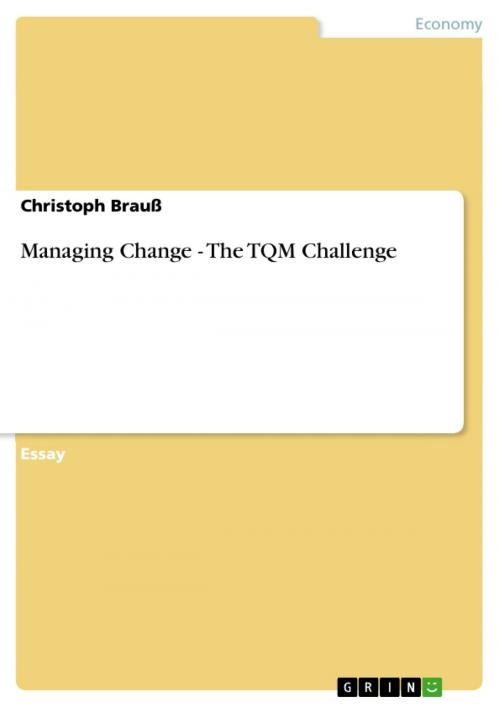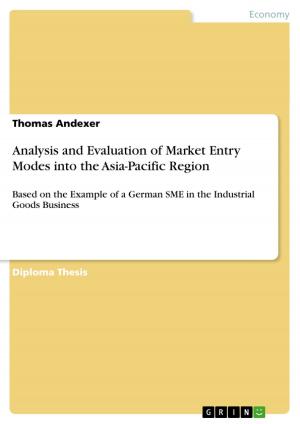Managing Change - The TQM Challenge
The TQM Challenge
Business & Finance, Management & Leadership, Management| Author: | Christoph Brauß | ISBN: | 9783638566636 |
| Publisher: | GRIN Publishing | Publication: | November 7, 2006 |
| Imprint: | GRIN Publishing | Language: | English |
| Author: | Christoph Brauß |
| ISBN: | 9783638566636 |
| Publisher: | GRIN Publishing |
| Publication: | November 7, 2006 |
| Imprint: | GRIN Publishing |
| Language: | English |
Essay from the year 2005 in the subject Business economics - Business Management, Corporate Governance, grade: 69, University of Glamorgan, course: M.Sc. Studium, 39 entries in the bibliography, language: English, abstract: In the today fast changing and global environment a successful implementations of modern and progressive strategies is the major success factor for a productive and competitive organisation. This organisational development is associated with the ability of change of the organisation itself. Furthermore it has to have the ability to adapt current market demands and apply them to the organisational behaviour and performance (McNish, 2001; Mullins, 2002; Rajagopalan, 1996). This change process includes organisational culture, process chains, people and processes management (Gillies & Horward, 2003; Doppler & Lauterburg, 2000). But the main focus of attention is in the responsibility of the management and the executives of the company. A special change process can only be implemented by the managers and it has to evolve within the organisation (Mullins, 2002). A change can be part of an organisational process - for example new machinery, equipment; regeneration of staff; market pressure; competitors; regular repair and maintenance, entrepreneurial growth and training and development of employees. The organisation itself has to be prepared to cross this change process regardingless if it is driven through external or internal forces (Pinnington & Edward, 2000; Burnes, 1997; Beer & Nohria, 2000). So this organisational change process regardingles if it is a minor, major or transformational change calls for more attention of diagnosing, facilitating, planning and reinforcing then in the past. Especially in the manufacturing, automotive and consumer electronics industry the striving for better quality, lower costs and higher productivity demands a planned change process (Jun, 2004). The following chapters outline an organisational change process in special manufacturing company. This major change is the sampling to lead the company to the theories of the Total Quality Management approach. It is surveyed with special consideration of the nature of change, change driving factors, the enforcement and resistance of this change. The paragraphs show a discussion about the implementation process of this organisational development with its challenges and chances of further development. This discussion is included in the organisational context.
Essay from the year 2005 in the subject Business economics - Business Management, Corporate Governance, grade: 69, University of Glamorgan, course: M.Sc. Studium, 39 entries in the bibliography, language: English, abstract: In the today fast changing and global environment a successful implementations of modern and progressive strategies is the major success factor for a productive and competitive organisation. This organisational development is associated with the ability of change of the organisation itself. Furthermore it has to have the ability to adapt current market demands and apply them to the organisational behaviour and performance (McNish, 2001; Mullins, 2002; Rajagopalan, 1996). This change process includes organisational culture, process chains, people and processes management (Gillies & Horward, 2003; Doppler & Lauterburg, 2000). But the main focus of attention is in the responsibility of the management and the executives of the company. A special change process can only be implemented by the managers and it has to evolve within the organisation (Mullins, 2002). A change can be part of an organisational process - for example new machinery, equipment; regeneration of staff; market pressure; competitors; regular repair and maintenance, entrepreneurial growth and training and development of employees. The organisation itself has to be prepared to cross this change process regardingless if it is driven through external or internal forces (Pinnington & Edward, 2000; Burnes, 1997; Beer & Nohria, 2000). So this organisational change process regardingles if it is a minor, major or transformational change calls for more attention of diagnosing, facilitating, planning and reinforcing then in the past. Especially in the manufacturing, automotive and consumer electronics industry the striving for better quality, lower costs and higher productivity demands a planned change process (Jun, 2004). The following chapters outline an organisational change process in special manufacturing company. This major change is the sampling to lead the company to the theories of the Total Quality Management approach. It is surveyed with special consideration of the nature of change, change driving factors, the enforcement and resistance of this change. The paragraphs show a discussion about the implementation process of this organisational development with its challenges and chances of further development. This discussion is included in the organisational context.















